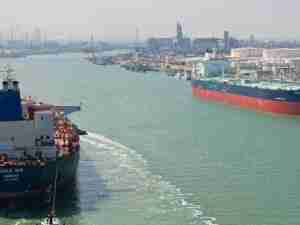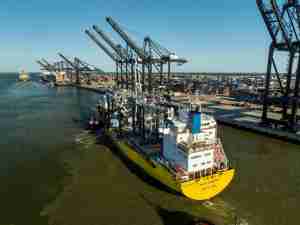Goldman fund sells stake in port operator SSA Marine
By: Reuters | Jan 07 2014 at 07:17 PM | Ports & Terminals
An infrastructure fund run by Goldman Sachs has sold its 49 percent stake in the holding company of SSA Marine, one of the world’s largest privately held port operators, SSA said on Tuesday.
The sale is the bank’s latest divestment in the resources and transportation sector, and follows last year’s sale of its power plant unit, Cogentrix. It is also considering the sale of its contentious metals warehousing business amid intense criticism of its role in the raw materials supply chain.
Financial details of the transaction were not released. A Goldman spokesman declined to comment on the sale.
GS Infrastructure Partners sold its shares in SSA Marine’s ultimate parent company, FRS Capital Corp, to the founding Smith/Hemingway family, SSA said in a release on its website. After the sale, Mexican businessman Fernando Chico Pardo took a 49 percent share in the business, they said.
The transaction comes as pressure mounts on Wall Street banks to get out of physical commodity trading, as well as new rules limiting direct financial investments.
“We’ve been fortunate the past seven years to work closely with one of the world’s leading investors in infrastructure and their fine people but appreciate that, as with all investment funds representing an array of investors, they approach their investments with a need to invest, hold and then sell over a defined time frame,” said Jon Hemingway, chairman of Carrix Inc, the immediate parent company of SSA Marine.
GS Infrastructure bought its stake in mid-2007.
SSA Marine, which is not a commodity trader, is involved in several large coal export terminals as well as container ports. It has activities at 210 terminal facilities and rail operations across the Americas, Asia and South Africa.
Carrix Chief Executive Knud Stubkjaer said that with Pardo’s capital investment the firm was “well positioned to continue expanding our activities, enhancing existing operations and adding new terminals, as well as implementing technological upgrades.”
Big banks still reeling from years of criticism after the financial crisis are also steering clear of controversy.
SSA Marine had been a target of environmental ire over their role in developing a proposed 48 million ton per year coal export terminal north at Cherry Point, Washington.
“Goldman Sachs’ stepping away from coal exports is yet another sign from Wall Street that coal export is a losing investment,” Crina Hoyer, executive director of RE Sources for Sustainable Communities, said in a statement.
Investment banks are also in the process of shedding commodity and energy trading operations, whose margins are likely to shrink further under new regulations.
The GS Infrastructure Fund is separate from the bank’s J Aron commodity trading division, which has also made direct investments in businesses including a Colombian coal mine.










